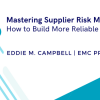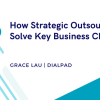The Growing Business Criticality of a Sustainable Supply Chain
Environmental and social governance (ESG) and sustainability have quickly transitioned from “nice-to-haves” to essential components of creating long-term, measurable business value.
Private sector leaders are starting to advocate for the transition to a stakeholder-based business model, recognizing sustainability and organizational performance aren’t mutually exclusive. And investors are realizing EBITA, EPS and CFFO aren’t the only measures of success, with ESG metrics being just as important when evaluating companies:
- 88% of studies found companies adhering to social or environmental standards showed better operational performance, with 80% showing a positive impact on stock performance.
- Sustainably minded shoppers will spend $150 billion on sustainable products by next year. That’s $14-22 billion more compared to prior years, pointing to new sales opportunities for businesses that prioritize sustainability in product development.
- Sustainable supply chain practices reduce costs by 9-16% and create a 15-30% increase in brand value. 73% of CEOS report sustainable business builds trust and reputation.
- Ignoring ESG exposes investments to huge risks and erodes returns. This behavior has wiped out $534bn of valuation in the last five years.
It’s also important to note that we’re experiencing unpredictable, turbulent times on a global scale. According to Bain & Company, COVID-19 is having a significant impact on the private equity industry. As dealmaking and lending activity slows in the months ahead, there’s a revitalized importance among PE investors to gauge a target’s resilience to supply-chain weakening. Recent research shows that high sustainability performers also outperform the market despite volatility. Now more than ever, sustainability performance in the supply chain will be an indicator of resilience and a source for investor confidence.
As the criticality of sustainability and ESG to the business grows, it’s crucial that brands leverage the supply chain as a differentiator and value creator.
Bringing Sustainability into the Supply Chain
Businesses are using sustainability to drive change and business strategy for a variety of reasons. Beyond investor pressure, there’s also heightened societal demand as climate change poses a more significant threat than ever.
A company’s supply chain represents a large portion of its sustainability footprint, generating, on average 5.5 times as many greenhouse gas emissions as its direct operations. And with most enterprises spending 50% to 70% of revenue in their supply base, there’s plenty of opportunities to foster responsible practices, while simultaneously driving market differentiation, innovation and growth, and more.
The globalized nature of today’s supply network poses challenges to securing these results. With dozens of touchpoints all over the globe, often in unregulated markets, the supply chain can breed serious hidden risks around forced labor, dangerous working conditions, information security lapses, quality issues, environmental waste, corruption and more. When left unmanaged, the impact of these threats hurt communities -- and the bottom line can take a big hit.
Businesses and their supply chains can be a force for good – and procurement leaders are a critical link between societal and financial impact. By implementing responsible procurement practices and incentives for suppliers, procurement teams can limit exposure to hidden risks and improve supply chain performance, which protects the wellbeing of local communities and directly and positively impacts the business.
This networked impact becomes real when the supply base is engaged, and every department within the organization is working together. While procurement holds the cards, creating a more responsible and sustainable supply chain is an organizational effort. Strong executive leadership and clear ESG and sustainability KPIs – specific goals for carbon footprint reduction, lower energy consumption, responsible labor practices and more – is foundational for success.
The Intersection of Sustainability, Finance and Supply Chain
As the private sector embraces a new form of capitalism that integrates purpose and corporate accountability, sustainable procurement initiatives are poised to take off globally.
81% of organizations state that over the past three years, their commitments to sustainable procurement have increased. With heavyweights – like BlackRock, which announced it will assess ESG with the same rigor as traditional measures such as credit and will push companies to disclose climate risks – and Hedge fund TCI – which launched a campaign to persuade central banks against funding companies that withhold carbon emissions disclosures – taking a stand, the momentum will only continue.
Many companies look to consultancies for guidance during transformative times, and leading firms such as Bain & Company are using ESG and sustainability ratings and intelligence to guide their counsel on corporate strategy, supply chain and procurement. As the latest testament to the business-critical role of ESG, Bain invested in EcoVadis to deepen their offerings and help clients improve overall sustainability performance by providing insight into risks across the entire supply chain and business commerce activities.
“Recognizing that social and environmental challenges are growing, timelines for addressing them are contracting, and companies are moving quickly to adapt, Bain & Company is committed to our mission of creating value – economic, social, and environmental – for our clients,” said Jenny Davis-Peccoud, co-head of Bain & Company’s global Sustainability & Corporate Responsibility Practice while announcing the investment.
It’s evident business success now lies at the intersection of sustainability, finance and supply chain. Companies with mature sustainable procurement programs report more benefits across the board, including 88% risk mitigation, 53% improved procurement metrics, 35% cost savings and 29% innovation – and all that leads to greater profitability and company valuations, lower cost of capital, and outcomes that benefit stakeholder and society. When sustainability is embedded into strategy and core business practices, the results follow.









